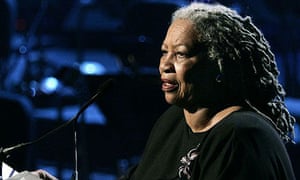
X Factor ... Toni Morrison gives a public reading in New York. Photograph: Jeff Christensen/AP
The perils of being a literary superstar
When thousands of adoring fans turn out for Toni Morrison, is it really her novels that have brought them along?
STUAR EVERS
Friday 31 October 2008
Standing ovations make me uncomfortable. It's their bullying nature that I object to, the way they shame you into standing whether you think a performance deserved it or not. So my heart sank when Toni Morrison was introduced at the Queen Elizabeth Hall on Tuesday. Looking out over the packed auditorium, I could already see the tell-tale signs, the visible twitchings of those almost ready to vacate their seats, the shall-we-should-we? looks between friends, the craning necks on the look out for likely trailblazers – but thankfully everyone stayed put. We all knew it wouldn't last.
When the moment came, however, it wasn't after the sparkling, honeyed magic of Morrison's reading. Had it been, I would have been happy to join the standing ranks. Her timing, her tonally rich and expressive voice combined to deliver a monologue that was as captivating as bewitching as an incantation. But no, not then. First there was a calmly marshalled conversation between Morrison and Hermione Lee, which was interesting without being inspirational, and a smattering of mercifully succinct audience questions. Then, finally, the crowd rose from their seats in appreciation of Oprah Winfrey's favourite writer.
I've been to readings on a similar scale, I've heard writers read who rarely appear in the UK, I've attended author events where fans are so passionate that touts sold tickets outside the venue. But I've never seen an audience get to their feet at the end of a series of audience questions. It was a perplexing sight. After all, what was it for? The quality of her answers? Her stance on the presidential elections? The reading for which she'd already been applauded?
It was more than just an audience applauding her and her work. I can't imagine, say, Philip Roth or John Updike receiving the same, despite their similarity in ages. Don DeLillo and Haruki Murakami – two novelists who rarely do events and also have a large devoted fanbase – were not afforded such public displays of affection when they read in London. Nor were their events charged with such an air of reverence and awe. So just what is it about Toni Morrison that makes her different?
Essentially, unlike those other writers, Morrison has transcended her status as a writer. Her Nobel laureateship combined with Oprah Winfrey's passion for her work, means that she is properly famous, familiar to millions on the television, friend of the Democrats, and the globally acceptable face of American culture. She is a personality, an iconic symbol of black womanhood - two things entirely disconnected from her writing. It's a dichotomy that she readily acknowledges.
In one of her questions, Hermione Lee asked Morrison about what it's like to be described as "America's conscience". Morrison retorted, laughing slightly, that she saw that person as someone else, some public figure who "sure doesn't do the writing". The audience laughed along with her, yet when it came for them to ask the questions, they were very much directed towards the public figure – famous Toni rather than writer Toni. This was perhaps most noticeable when Morrison was asked to comment on her life's "journey", as though she'd trekked from rural Ohio with two kids on her back to perform on X Factor.
All writers, to a greater or lesser extent, have to have a private and a public persona. But real fame complicates this already tender balance. Once an author has made that leap in to the public gaze, regardless of their reputation and their authorial qualities, their reputation is in danger of taking a nosedive. Somehow, outside of the rarefied literary community, they appear less serious, less important as cultural figures – as Martin Amis, post-teeth, discovered. The same fate befell Salman Rushdie as his marriage and New York socialising became marginally more interesting than his increasingly turgid novels. Fame is a prism that alters both perception of writers and the writers themselves, and rarely is this for the good. Toni Morrison is perhaps the exception.
As I left the venue on Tuesday, it was gratifying to see a fat knot of people at the Foyles concession, pre-signed copies of A Mercy disappearing as quickly as black t-shirts at an AC/DC gig. Gratifying because it's a novel of true narrative and linguistic splendour that bears comparison with her best work; and also as proof that fame has widened her readership rather than flattened her prose.


No comments:
Post a Comment